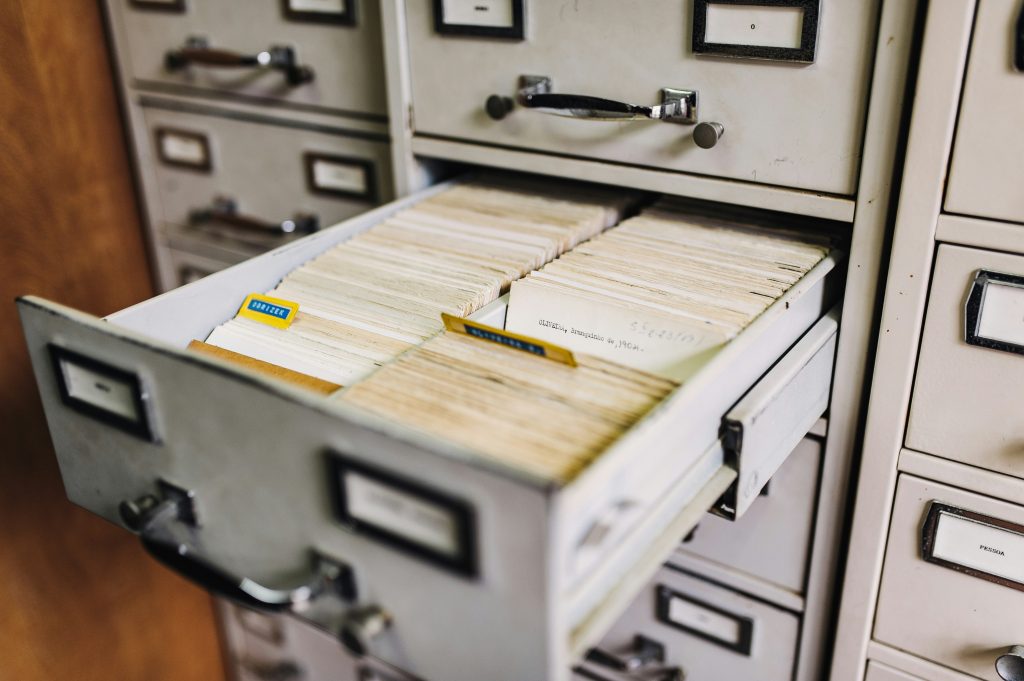We all know that there are documents that would be wise to have on hand—but sometimes the details evade us, which documents should we keep where? And for how long? And what do we do when we don’t have something we need? In this article, we’ll unpack “The Caterson Drawer” a quick list of documents that should be safely stored for future need.
Here are the documents that you want to make sure that you keep safely on hand:
Church Property Deeds and Surveys
- Surveys of property and buildings conducted to identify architecture, utilities, environmental or historic data, and title searches, noting any changes that have occurred.
- If you are missing your deed or survey documents, contact your local municipality office or County Clerk’s Office as they should have copies on file.
Incorporation Documents
- Incorporation documents are required by GNJAC and New Jersey requires an entity to be incorporated to hold title to property. New Jersey has a separate incorporation statute for churches.
- You can search for your documents here.
The General Council on Finance & Administration 501 (c) (3) Private Letter Ruling
- The General Council on Finance & Administration 501 (c) (3) Private Letter Ruling that identifies United Methodist churches as nonprofit entities since 1974. Some missions need to request a restatement for their inclusion in the umbrella status. New church starts need to request inclusion of their EIN to the Private Letter Ruling umbrella.
- Church Group Ruling – Tax Exemption page on the GFCA website.
Federal Employer Identification Number (EIN)
- Federal Employer Identification Number (EIN) required for all filings, including employee taxes and tax-exempt status.
Leases or Use Agreements
- Rental agreement or building-use agreements for any group using the building for a couple of hours.
- Parsonage location and information (Book of Discipline ¶2503). Parsonage rental agreements should be reviewed by legal counsel and may trigger tax implications if not used for a missional purpose.
For GNJ lease agreement requirements, including insurance requirements, click here: https://www.gnjumc.org/usage-lease-agreement/
Insurance Policies
- Property Insurance, including replacement, liability, and other appropriate coverage;
- Health Insurance, including verification of any coverage provided to staff or pastor;
- Vehicle insurance verification of coverage, if applicable.
Titles
- Titles for all vehicles and dates when registration, inspection, and insurance expire.
Tax & Tax Exemption Forms
- Copies of all letters sent to donors for their tax deductions for previous two years.
- Employee information and filings (W2’s, 1099’s , 941, 927, WR30, etc.).
Bank Accounts & Investments
- Bank accounts: numbers, statements and the names listed as “signers” with each financial institution.
- Investments: account numbers and summary of all assets, including Endowment Funds and Trusts and “signers” or authorized contact persons.
- Copies of all donor restricted bequests to the church through Wills and Trusts.
Church policies
- Church policies, including but not limited to, Safe Sanctuary, Fire Drills, Financial Policy & Procedures, policy for distribution of Pastor’s Discretionary Fund, etc.
Current Charge/Church Conference Report Booklet
Cemetery Information (if applicable)
- Deeds
- Policies describing who can be buried, what can be erected or put on site, temporarily or permanently, and maintenance expectations and rules.
- Columbarium construction and policies for disposition of cremains.
- Copies of bank statements for the perpetual care fund.
This is a brief overview of the files that you should safely store and regularly maintain. Taking a few minutes once a year to make sure you have everything you need will save you major headaches down the road. Click here for a comprehensive list.
Photo by Maksym Kaharlytskyi on Unsplash

